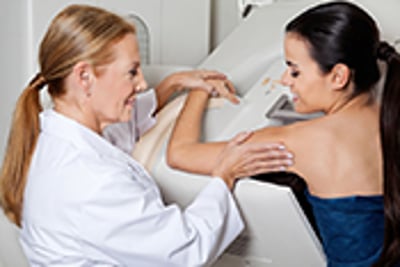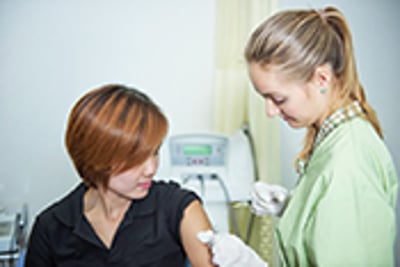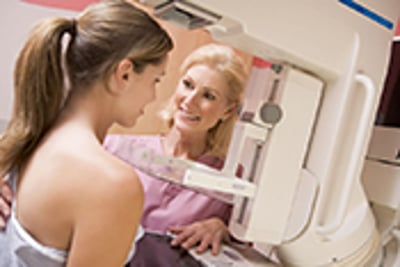FORCE's eXamining the Relevance of Articles for You (XRAY) program looks behind the headlines of cancer news to help you understand what the research means for you.
XRAY is a reliable source of hereditary cancer research-related news and information.
Learn more about the XRAY program
Categories Prevention, Screening
Relevance: Medium


Strength of Science: Medium


Research Timeline: Post Approval


Study : Do physicians recommend breast cancer screenings based on guidelines?
Relevance: Medium


Strength of Science: Medium


Research Timeline: Post Approval


Most relevant for: Women at average risk for breast cancer
Several guidelines help physicians decide when a woman should begin screening for breast cancer and how often she should be screened. However, are these guidelines put into use in the clinic? (8/8/17)
Read More
Relevance: Medium-Low


Strength of Science: Medium-Low


Research Timeline: Animal Studies


Article : Report on vaccines to prevent hereditary cancer
Relevance: Medium-Low


Strength of Science: Medium-Low


Research Timeline: Animal Studies


Most relevant for: High risk women who have not had breast cancer
On 05/30/2017, Good Morning America aired a segment entitled “Can a vaccine help prevent breast cancer at its earliest stages?” The story outlines the need for cancer prevention and hints at early research into a cancer vaccine. (8/1/17)
Read More
Study : Diet during teen years and early adulthood is linked to breast cancer risk
Most relevant for: Adolescent and young adult women
During teen years, breast tissue grows rapidly in young girls and is more likely to be harmed by substances that are known to cause cancer. Few studies have looked at the relationship between diet during puberty and breast cancer risk. This study looks at how a woman’s diet during their teenage years and early adulthood is associated with breast cancer development later in life. (6/30/17)
Read More
Article : FDA busts myths of preventing and treating cancer by eating apricot kernels, herbs, and other ingredients
Most relevant for: People diagnosed with or concerned about their risk for cancer
Maggie Fox (NBC News) writes about a new FDA report that warns of 14 "fraudulent” cancer products claiming to either cure or treat cancer (1). The companies that sell these products claim that many of them also prevent cancer, but are they safe or effective? (6/26/17)
Read More
Relevance: Medium-High


Strength of Science: Medium-Low


Study : Routine breast cancer screening leads to overdiagnosis
Relevance: Medium-High


Strength of Science: Medium-Low


Most relevant for: Women at average risk for breast cancer
Routine breast cancer screening for women of average risk has been controversial for many years because some believe that the benefits do not outweigh the risks. Recent headlines covering a study in Denmark suggests that routine breast cancer screening leads to “overdiagnosis” of breast cancer. (4/4/17)
Read More
Relevance: Medium-High


Strength of Science: Medium


Study : Women with breast cancer symptoms but no lump may wait longer to seek medical care
Relevance: Medium-High


Strength of Science: Medium


Most relevant for: People with breast cancer symptoms
Some patients take longer than others before getting a potential breast cancer checked by their health care provider. Believing that women who have breast cancer symptoms but have no lump may wait longer, researchers in this study used data from women who were diagnosed with breast cancer in 2009 and 2010 to identify possible explanations. (1/18/17)
Read More
Study : Angelina Jolie spoke out on BRCA testing: Did genetic testing increase?
Most relevant for: People interested in genetic testing for an inherited mutation
Angelina Jolie published an editorial in the New York Times in 2013 about her choice to have a double mastectomy after finding out she was positive for a BRCA1 mutation. Researchers from a recent study claim that her celebrity endorsement of BRCA testing may have missed its target audience (previvors), due to the increase in BRCA testing following publication of the editorial but a decrease in the number of mastectomies performed. However, the study failed to take into account that many women without breast cancer do not pursue mastectomy in the months following genetic testing. (1/4/17)
Read More
Article : After mastectomy: reconstruct or not?
Most relevant for: Woman who are facing mastectomy
Today, more women know they can have breast reconstruction after removing their breasts for cancer treatment or risk reduction. But what about choosing not to undergo reconstruction? Roni Caryn Rabin writes about the experiences of women who decide against reconstruction in her New York Times piece “‘Going Flat’ After Breast Cancer.” (12/14/16)
Read More
Personal Story : Why one woman passed on genetic testing
Most relevant for: People considering genetic testing and people who are Ashkenazi Jewish
What are reasons to get or not get genetic testing? Cynthia Graber gives her thoughts on the matter in her Wired opinion piece, "Why I Won't Get the Genetic Test for Breast Cancer." (11/15/16)
Read More
Study : Removing ovaries before age 50 may increase the risk of chronic conditions for some women
Most relevant for: Women under 50 years of age who have had or are considering removing their ovaries
Removal of ovaries and fallopian tubes prevents ovarian cancer, but it may come with other health risks. Experts recommend removal of ovaries and fallopian tubes in women at high risk for ovarian cancer due to inherited mutations in BRCA or other genes linked to ovarian cancer risk. For these high-risk women the benefit of ovarian cancer prevention outweighs the risk of long-term complications. Based on a recent study, some researchers feel that for women who are not at increased risk for cancer, the risk for some chronic conditions is too high to consider removal of both ovaries. (11/1/16)
Read More